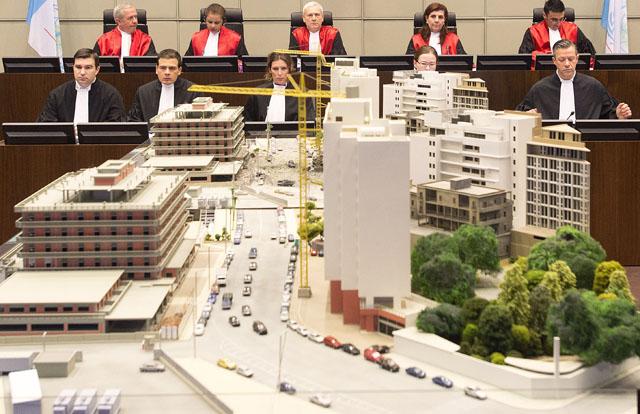You are here
Hariri killing trial opens with Lebanon tensions high
By AFP - Jan 16,2014 - Last updated at Jan 16,2014

Netherlands — Four Hizbollah members went on trial in absentia at a special UN tribunal on Thursday accused of murdering Lebanon’s former premier Rafiq Hariri in a 2005 car bombing that shook the Middle East.
The trial opened in a suburb of The Hague nine years after the huge Beirut blast that killed billionaire Hariri and just hours after another deadly car bombing in a Hizbollah stronghold near war-ravaged Syria.
A packed public gallery looked on as the repeatedly delayed proceedings began, with a large scale model of downtown Beirut where the 2005 attack happened on a table set up before judges.
Hariri’s son Saad — who himself was prime minister 2009-2011 — sat in the courtroom behind the victims’ representative. Dressed in a dark suit, his hands were folded as he listened attentively.
The Special Tribunal for Lebanon (STL) is unique in international justice as it was set up to try the perpetrators of a terrorist attack and because it can try the suspects in absentia.
Hariri, Lebanon’s Sunni prime minister until his resignation in October 2004, was on his way home for lunch when a suicide bomber detonated a van full of explosives equivalent to 2.5 tonnes of TNT as his armoured convoy passed.
The February 14, 2005 seafront blast killed 22 people including Damascus opponent Hariri and wounded 226, leading to the establishment by the UN Security Council of the STL in 2007.
Prosecutors will aim to prove the accused men’s involvement through tracking their alleged use of mobile phones before, during and after the attack.
Suspects belong to Syria- and Iran-backed Hizbollah
Although the attack was initially blamed on pro-Syrian Lebanese generals, the court in 2011 issued arrest warrants against Mustafa Badreddine, 52, Salim Ayyash, 50, Hussein Oneissi, 39, and Assad Sabra, 37, all members of the Syrian- and Iranian-backed Shiite movement Hizbollah.
A fifth suspect, Hassan Habib Merhi, 48, was indicted last year and his case may yet be joined to the current trial.
“The attackers killed innocent bystanders, a student, a hotel worker, a cousin, a father, a brother, friends,” chief prosecutor Norman Farrell said in his opening statement.
“Clearly their aim was not only to ensure that the target was killed, but to send a terrifying message to cause panic among the population of Beirut and Lebanon,” he said, showing the court a graphic photograph taken shortly after the blast, with smoke, flames and Hariri’s vehicle on fire.
The four suspects have been charged with nine counts, ranging from conspiracy to commit a terrorist act to homicide and attempted homicide.
Prosecutors allege that Badreddine and Ayyash “kept Hariri under surveillance” before the Valentine’s Day suicide bombing, while Oneissi and Sabra allegedly issued a false claim of responsibility to mislead investigators.
Mobile phones ‘key evidence’ — prosecution
Co-prosecutor Graeme Cameron on Thursday described how different mobile phones were bought with false identities and used in networks in the run-up to the attack.
Prosecutors said that a “red group” of eight phones used until minutes before the bomb exploded was particularly important to the case.
Directly after the assassination, “the red group phones went silent. They were never used again”, Cameron said.
Court-appointed lawyers for the four defendants have voiced concern about the case, saying they were hamstrung by a lack of resources and the fact that they were unable to consult their clients.
The trial is not “about seeking vengeance, but seeking justice,” Saad Hariri told journalists outside the STL’s fortress-like courthouse.
“Today is a day when we in Lebanon say ‘finally, a step in the right direction’... We have waited for a long time,” Saad said, amid heavy security.
The STL initially sparked fierce debate in Lebanon, sharply divided into the camp led by Hizbollah and its rivals in the March 14 movement, set up in the wake of Hariri’s assassination and led by Saad.
The powerful Hizbollah has denied responsibility for the attack, and its leader Sayyed Hassan Nasrallah has dismissed the tribunal as a US-Israeli conspiracy.
Sectarian tensions have soared in Lebanon since Hizbollah openly intervened in the conflict in neighbouring Syria alongside President Bashar Assad’s forces last year.
A car bombing on Thursday killed at least three people in downtown Hermel, a Hizbollah stronghold near the border with Syria.
Syria and Hizbollah were blamed for the December 27 assassination of former finance minister Mohamed Chatah, an aide to Saad Hariri, in another downtown Beirut bombing.
Chatah was the ninth high-profile critic of the Syrian regime to be killed in Lebanon since Hariri’s assassination, and his death served to remind many Lebanese that no one has been held accountable for those killings.
Related Articles
LEIDSCHENDAM, Netherlands — A UN-backed court sentenced two Hezbollah members in their absence to life imprisonment on Thursday for a huge B
THE HAGUE — Judges at a UN-backed tribunal will rule on Wednesday whether to acquit one of four suspected Hizbollah members accused of the 2
THE HAGUE — The Hizbollah member convicted of the 2005 assassination of former Lebanese premier Rafic Hariri should receive a life sentence,















